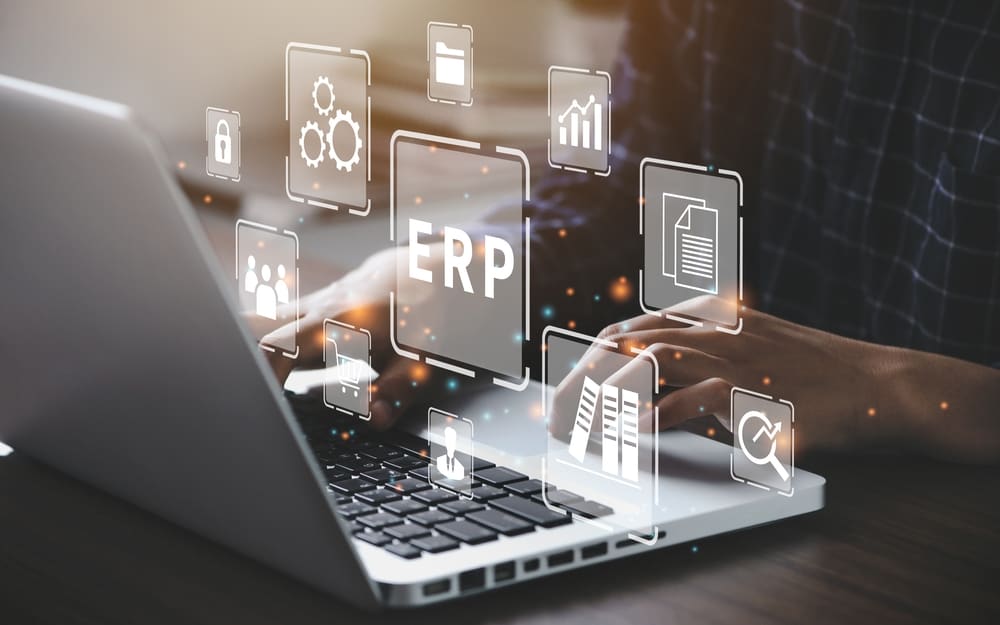This article will explore how ERP accounting software can improve business functions and processes.
ERP Software Explained

ERP (Enterprise Resource Planning) systems are online platforms that streamline many aspects of business processes. This includes finance, supply chain management, manufacturing, resource planning, human resources, and much more.
ERP systems can better the organization of all aspects of a business, accounting included. On top of integrating with other departments, ERP software performs several accounting-specific functions. This includes accounts payable, accounts receivable, and financial reports tools.
Many businesses have switched to cloud-based ERP software, including the UK government.
The Main Enterprise Resource Planning Functions for Accountants
The main ERP functions for accountants are as follows:
Accounts payable
ERP can organise all the money you owe and the accounts you owe them to. Most come with tools to track payment due dates, record vendor invoices, and generate payment vouchers.
Accounts receivable
Similarly, ERP solutions can keep tabs on all the money you are owed. For example, this software can manage customer credit limits, and chase up customer invoices and payments. ERP systems can also calculate the amount of interest owed for overdue payments and help with customer management.
General ledger
Information from accounts payable and receivable (and other data sources) can be gathered and displayed in the ERP general ledger. All transactions can be recorded in this ledger and accounts can be maintained for assets, liabilities, expenses, and revenue.
Financial report generation
With ERP you can create income statements, balance sheets, and other cash flow statements. Creating customized reports is a big part of accounting and ERP can help cover this part of the job.
Tax management
You can also use ERP to calculate taxes and create tax reports. This makes it far easier to keep on top of the money your company will owe in tax, and also more easily comply with tax regulations.
Why Use an ERP System in Accounting?
The main benefit of using an ERP system for accounting is the connectivity provided between accounting and other departments. You don’t need to introduce a separate accounting platform for your business accounts processes. Instead, one single interface can be accessed by all departments, which boosts compatibility and collaboration.
Here are some more specific reasons why ERP makes great accounting software:
Removes the risk of duplicate data
With ERP software in place, all your business operations data will become centralized. Inventory management, transactions, and sales info will be located in the same place. This way, accountants are less likely to duplicate data with ERP systems than if they had to pull financial data from multiple platforms.
Grants accountants more access to information
ERP systems allow accountants to review customer relationship management data. For example, they can assess why customer purchasing behaviour has recently changed or gain a more accurate idea of transaction volumes.
Real-time data
As soon as something changes, the entire ERP software is updated. Accountants don’t have to wait for data to transfer between one system and another. Instead, they receive new information instantly. This allows their data reporting to be more up-to-date and, therefore, accurate.
Synchronized work
With multiple departments synching and working together, business efficiency is increased. Accountants can communicate with other departments faster than ever before, discrepancies can be sorted at a quicker rate. Overall, this means that accounting processes can be sped up and completed sooner.
The Limitations of Enterprise Resource Planning
Despite the positives listed above, there are some limitations of ERP and accounting software. Namely, it can be difficult for some businesses to implement company-wide software in all departments overnight. This is mainly due to a reliance on old software models and a reluctance to switch to something else, rather than a fault with ERP systems themselves.
Additionally, the upfront cost and training time involved in implementing enterprise resource planning software can be difficult for small businesses.
Final Thoughts
Enterprise Resource Planning (ERP) software can improve all core business processes, including accountancy work. It helps accountants better organize accounts payable and receivable, and keep on top of taxes – amongst many other functions.
To get the most out of ERP, you should hire an accountant.
Sources:
https://www.versapay.com/resources/erp-system-accounting